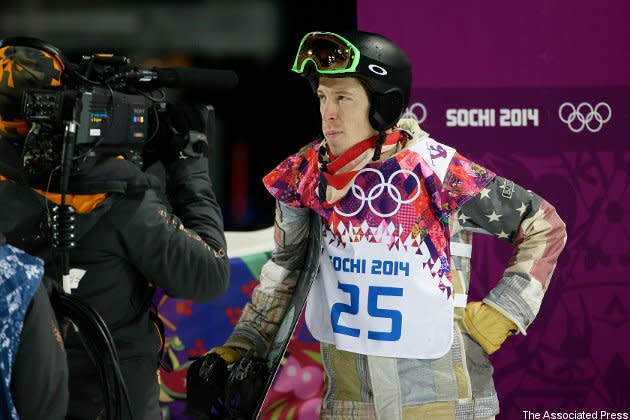Shaun White finishes fourth: his legacy may be building snowboarding to a point where he faces stiff competition, including top Canadians
At first glance, some Canadians might react to American snowboarder Shaun White's fourth-place finish in the halfpipe with glee. After all, White has become a polarizing figure, thanks partly to Canadian snowboarders Max Parrot and Sebastian Toutant publiclycriticizing his late (late enough that the U.S. couldn't send a replacement) decision to pull out of slopestyle and focus on the halfpipe; those criticisms drew negative comments from south of the border, causing other Canadians to react against White. White failing to win his third-straight gold and finishing out of the medals entirely (which were won by Switzerland's Iouri Podladtchikov and Japan's Ayumu Hirano and Taku Hiraoka) can be seen as proof that there's a new generation of top snowboarders on the rise, and there are plenty of Canadians amongst them, including Parrot, Toutant and eventual slopestyle bronze medalist Mark McMorris;. However, this was still an impressive showing from White in several ways, and he's a crucial part of the reason Olympic snowboarding (and snowboarding in general) has become so big. His fourth-place finish Tuesday might not have been the best result for him personally, but it shows how good the snowboarding field has become, and much of that is thanks to White.
The backlash against White has spread further than Canada, of course; he was also criticized by some of the American riders in slopestyle (including Chas Guildemond and eventual gold medalist Sage Kotsenburg) for the timing of his announcement preventing another U.S. rider from competing, and some of the snowboarding world in general (which has always had some counterculture elements, making it an odd fit at the Olympics) had already turned on White before these Games for the mainstream, commercial presence he built after his second straight halfpipe gold in Vancouver. That's somewhat short-sighted though, as it's that same presence (and the countless hours White spent promoting snowboarding through various interviews, public appearances, et cetera) that helped to elevate freestyle snowboarding into one of the most anticipated parts of the Sochi Games. It's important to note that that's where the criticisms of White from Parrot and Toutant really sprung from. They don't hate the guy; they were upset they didn't get the chance to beat him on the course. That says a lot about White's importance to snowboarding.
It's also notable that while this fourth-place finish is being billed as a major failure for White and an indication he's lost his edge, it wasn't really. In fact, he recorded the highest score of the day, a 95.75 in the qualifying round. It was just his final run that was weaker, scored at 90.25 thanks mostly to some uneven landings. That should be something that snowboarders like Parrot and Toutant can emphasize with. Parrot recorded the highest slopestyle score of anyone at these Games, laying down an incredible 97.5 in qualifying, but he finished out of the medals after struggling in the finals, as did Toutant. Meanwhile, Canada's lone medal there came from McMorris (who, interestingly enough, attracted much of the attention that's seen him become a global phenom thanks to being built up as a rival to White), who struggled in qualifying, but did better in the final. Freestyle snowboarding has turned into a deep sport where almost anyone can win on any given day, and a lot of that is thanks to the profile boost White helped to give it. A final run out of the medals doesn't indicate you're a lousy boarder or you've lost your edge; it shows just how many top people there are in this sport now.
If White elects to walk away from the sport after this, as some expect him to, his legacy is secure. The gold medals he won in Turin and Vancouver say a lot about just how good he was, as do the astounding 13 golds he won at the Winter X Games (plus the two Summer X Games golds he won in skateboarding). What's perhaps even more impressive is how far snowboarding has come during his career, though. It's gotten to a place where he's just one outstanding rider, not the one guy who singlehandedly dominates the sport at the Olympic and X Games levels, and his efforts to build its profile have a lot to do with that. White may not be done yet, as he's just 27, but if he does continue, it will be as a top contender, not as the sport's lone superstar. That's a good thing for snowboarding overall, and it's a great thing for Canadian boarders like McMorris, Parrot and Toutant. White may have been unable to turn back time Tuesday, but while that leaves him without a medal, it says only good things about where this sport is at.

 Yahoo Sports
Yahoo Sports 


